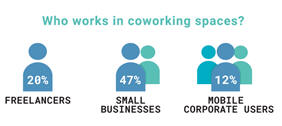|
Trend
Report: continued
The GWA is releasing results from their
2017 Industry Financial Survey, which is sent to
hundreds of shared workspace operators. Here are a few
of the key takeaways:
1. Private
Businesses and Landlords are getting into the flexible
workspace game.
This year we’re seeing flexible options
from landlords and private businesses grow faster than
anyone expected. According to a
recent Liquidspace report,
36% of the transactions on their platform are through
private businesses or landlords offering extra space
directly to consumers. Jamie Russo, Executive Director
of the GWA, says, “The Commercial Real Estate industry
may not have historically described itself as ‘nimble
and innovative,’ but that may just be the behavior that
we’re starting to see. This growth in transactions from
landlords suggests demand for coworking, particularly
from corporations, is growing. Landlords are
increasingly seeking creative relationships with shared
workspace operators in order to effectively activate
their flexible offerings.”
The predominant approach is still the
operator leasing the space, with 72% of respondents
following that model. 19% of the respondents own their
space, 3% reported a joint venture between the operator
and the landlord, and 1% reported a management contract
between the operator and the building owner. GWA
research anticipates seeing less leasing and more
operator/owner relationships in the next five years.
2. There
is an increasing focus on the user experience.
Two of the hottest buzzwords in the
workspace industry right now are “consumerization” and
“user-centered.” Everyone from landlords to corporate
real estate departments to temperature control start-ups
are focused on serving the “HDTV” consumer that expects
a high level of design and hospitality at the corporate
office, what the industry calls their “third space.”
3. Open
plan ≠ Coworking. Users are looking for productivity,
not just a place to network.
Today 80% of coworking spaces offer
private offices. While private spaces for individuals or
teams make startup-costs higher for the operator, the
demand seems to be growing for them.
Russo explains, “There is a big myth that
coworking means open workspace. When the industry
started to emerge in 2006, layouts were primarily open
space and the hosts were focused around the simple idea
of bringing people together to work. That approach
worked for a period of time, but today the makeup of
users and their space requirements is evolving.”
No longer are programmers and freelance
designers the core membership. The GWA data shows that
makeup of audiences today is 20% freelancers, 47% small
business, and 12% mobile corporate users.

Freelancers are the individuals that are
mostly doing computer work, so when coworking started it
was focused there and open plan made sense. However, the
demand for flexible office space is increasing through
the sharing economy and is creating a shift in demand as
corporate and small businesses users are on the rise. As
the makeup of users shifts, the needs for layout in
coworking spaces shifts, too. GWA data shows us the
importance of variety in spaces in order to create the
environment that makes coworking communities thrive. In
fact, today’s data tells us that conference rooms and
private offices are the most frequently offered spaces
across all flexible workplace types. The supply side is
reacting to that demand and creating more private
spaces.
Data from members of shared workspaces
indicates that the number two reason that people use
shared workspaces is productivity. Some may lump
networking under the productivity umbrellas (i.e.
productively chasing new business under one roof), but
it more likely means getting work done. For many,
getting focused work done is simply easier to do in an
area with four walls where you can control the stimuli
(chatter, people walking by, Skype calls, etc.) Still,
productivity looks different for different audiences,
and that is changing the face of these spaces.
Sourced and adapted from: http://www.huffingtonpost.com/entry/coworking-grows-in-2017_us_59764201e4b0940189700bc6
back home
|